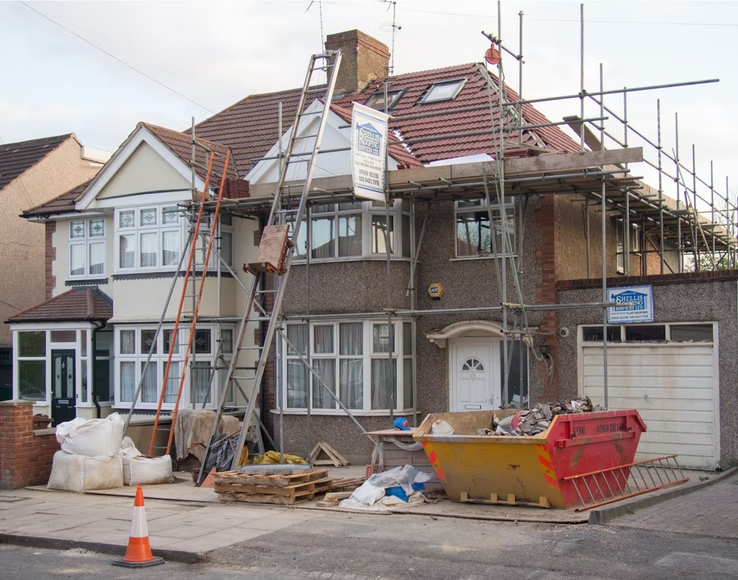Building a house is a huge undertaking. It’s a complex process that can take months or even years.

There are many things to consider before starting construction, from the design of your home to the budget you’ll need to build it. If you’re thinking about building a house, make sure you know these 10 things first.
Set a Realistic Budget
Building a house is costly and a key difference between building and buying a home. It’s therefore essential to have a clear idea of how much money you can realistically spend before you start.
Several factors will affect your budget, including the cost of materials, labor, and permits.
Additionally, you need to factor in the price of any professional services that you may need, such as an architect or interior designer.
By taking the time to understand your budget, you can avoid any nasty surprises down the road and ensure that your dream home doesn’t become a financial nightmare.
Read Also:
Choose A Reputable Contractor
If you’re considering building a house, one of the most important things is choosing a reputable contractor.
A reputable contractor will be able to help you with the entire process from start to finish, and they will also be able to provide you with the best possible price for constructing your new home.
Furthermore, a reputable contractor will also help you avoid any pitfalls you may encounter during the construction process.
Choose a contractor who has experience building homes and is familiar with the area in which you plan to build your new home. Make sure that they have experience building the type of house you want.
Check their references and reviews to understand how others have felt about their work. Finally, be sure to get everything in writing before work begins.
Familiarize With the Region’s Zoning Laws
Before beginning any construction project, it is essential to check that the land is appropriately zoned for the proposed development. Zoning laws are put in place by local governments to regulate land use.
They determine what type of development is allowed in a particular area and help ensure that neighborhoods remain cohesive.
For example, building a house in an area zoned for commercial use is not likely to be permitted. Sometimes, a zoning variance may be possible, but it is always best to check the zoning regulations before purchasing land or starting any construction work.
By ensuring the ground is zoned correctly, you can avoid the hassle and expense of having to stop work or demolish your home.
Consult Professionals
It’s important to consult with an architect or engineer to make sure your home is structurally sound and will meet all building codes. They can help you assess the property, identify potential problems, and develop solutions that will make your house safe and strong.
In addition, they can also offer guidance on layout, design, and materials, ensuring that your home turns out exactly the way you want it. Before you start construction, be sure to consult with a professional to ensure your project goes smoothly from start to finish.8
Acquire the Necessary Permits
It’s vital to ensure you have all the necessary permits in place. Depending on your location, several different permits may be required for construction. You may also need permission from your local homeowners’ association or other regulating bodies.
Failure to obtain the proper permits can result in delays, fines, or even having to tear down the completed house. Before you start building, do your research and ensure that you have all the necessary permits in place. It will save you a lot of headaches down the road.
Inspect Regularly and Get Involved
Getting involved in the construction process as much as possible is essential. By working closely with your builder, you can ensure that your home is built exactly the way you want.
You’ll be able to choose your materials, floor plan, and fixtures and ensure that every detail is perfect.
Since building a house is a big undertaking, it can be tempting just to let the professionals handle everything.
However, this can often lead to disappointment, as builders may not always have the same vision for the home as the owner. If you want your home to reflect your style and meet all of your needs truly, it’s essential to take an active role in the construction process.
Prepare for Delays
No matter how well you plan or how experienced your contractor is, there will always be some unforeseen circumstance that pops up.
Many factors can contribute to delays, including bad weather, material shortages, delayed permits, and unexpected problems with the construction site. Any of these issues can set back a project by days or weeks.
It is essential to build flexibility into the construction schedule. By allowing for potential delays, you can avoid the frustration and financial losses that can occur when a project is delayed.
Keeping open lines of communication with all parties involved in the construction project is crucial, as it helps you ensure that the project stays on track.
Remember, the goal is to end up with a beautiful home that meets your needs, not to get the task done as quickly as possible. With a bit of flexibility and planning, you can minimize the impact of delays and enjoy the process of building your dream home.
Prepare for Cost Overruns
One of the most important things to remember is that costs can quickly spiral out of control. Even if you have a strict budget, unforeseen expenses can always pop up.
There are a lot of factors that can contribute to cost overruns, from unanticipated repairs to lousy weather. There’s always the possibility that you’ll change your mind about something during the construction process.
That’s why it’s crucial to be prepared for cost overruns before building your house. Have a cushion in your budget for unexpected expenses, and be willing to compromise on some of your original plans if necessary.
With a bit of planning, you can avoid common pitfalls during the construction process.
Have a Good Insurance Policy
It is crucial to ensure you have a good insurance policy. This will protect you in case of any accidents or damage during construction. Construction can be a risky business, and it’s important to have financial protection in case something goes wrong.
Your insurance policy should cover the property and any liability arising from the construction process. Once you have your insurance sorted, you can relax and enjoy the process of building your dream home safe in the knowledge that you’re covered if anything goes wrong.
Clarify Present and Future Needs
It’s essential to have a clear idea of your present and future needs before you start construction. For example, if you’re planning on starting a family soon, you’ll need to ensure that your home has enough bedrooms and bathrooms.
Alternatively, if you’re nearing retirement, you may consider features that will make your home more accessible, such as main-level living or an elevator.
Once you know what you need, you can start planning the layout of your new home. This will save you time and money in the long run, as you won’t have to make any significant changes once the house is built.
In addition, by thinking about your future needs now, you can create a home that will grow with you over the years. By taking the time to understand your needs, you can build a house that will suit your lifestyle now and in the future.
Building a house is a considerable investment. Before starting the process, it’s essential to do your research and have a realistic idea of what you can afford.
Work with an experienced contractor, take your time in choosing finishes and materials, and be prepared for the unexpected. By following these tips, you’ll be on your way to building your dream home without any of the stress!









